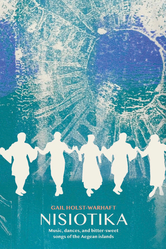
Gail Holst-Warhaft
Nisiotika
Music, dances, and bitter-sweet songs of the Aegean islands
Dance! dance! enjoy your youth because you won't find it again in this world.
Let the dancing go on,
this earth will eat us,
this earth will eat us,
let the dancing go on. Whoever has a good heart and often celebrates, they're the only ones who enjoy this false world.
This earth we're treading
we'll all go into one day,
we'll all go into one day,
this earth we're treading.
Nisiotiko song from Naxos
Nisiotika is a book about the living tradition of Greek island music. Nisiotika derives from the Greek word for island, nisi, and has come to describe in particular the music and songs that are played and sung at festivals and celebrations on the islands of the Aegean. It is music to be danced to, and, as revealed in this book, in traditional celebrations with live music it is the dancers who call the tune.
The songs tell of the sea and people whose lives are bound up with often dangerous sea trades, of love and of pretty girls, sometimes of historical events, but also of sadness and separation, of women who wait in fear for their husbands and sons to return from long voyages or faraway lands. Most of the songs are not very old and date probably no earlier than the late eighteenth or early nineteenth century, although they borrow musical and poetic motifs from older forms of Greek folk song. The most common instrumental accompaniment to them is the violin, often played together with a laouto (folk lute), but the tsambouna (bagpipes) and the santouri (hammered dulcimer) are also very popular. Like the rembetika, the songs of the underground and of urban Greece, the nisiotika only became pan-Hellenic music after the islanders emigrated, initially to the US and then later to Athens. It was then that their songs were recorded and a wider audience for their music was created.
Building on the work of pioneering musicologists and through independent research into the songs themselves, recordings and interviews, Gail Holst-Warhaft has turned the same discerning and loving eye on nisiotika as she did in her now classic book on rembetika, Road to Rembetika.
The text is richly illustrated with photographs and includes a collection of the songs in Greek with English translation en face.
‘As soon as one picks up your book, they will find it hard to put it down —— it is written with so much enthusiasm, with so much joy, but also [covers] a whole host of things which I for one did not know about at all and which I delighted in reading.’
From a letter to Gail Holst-Warhaft from Alexis Politis, Professor Emeritus, University of Crete, author of The Demotic Song [in Greek], Crete 2010.
- 292 pages, 25.0 x 13.6 cm, 2021
Extract from this book for viewing